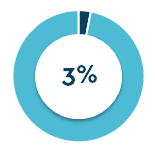A healthy diet plays a key role in improving and maintaining our overall health and wellbeing. Focusing on what we fuel our body with can help increase our energy levels and improve our mental health. But it’s not always easy, especially if our days are packed with commitments and lists of chores.
Did you know?
| 1 | A healthy diet can help protect us against diseases including diabetes, cancer, stroke and heart disease. |
| 2 | Eating complex carbohydrates (like vegetables, fruit or wholegrain bread) and protein-rich foods (meat, chicken, fish, yoghurt or legumes like chickpeas) at regular intervals during the day can help to give us more energy and avoid a mid-afternoon slump. |
| 3 | Research shows that reducing meat intake can lower our risk of heart disease, diabetes, high blood pressure and high cholesterol, so aim for at least one plant-based day each week. |
 |
Only 1 in 13 adults eat enough fruits and vegetables |
 |
Australians spend a third of their weekly food budget on fast-food |
“A healthy outside starts with a healthy inside.”
– Robert Urich
Top tips for better health on the go
 |
Reduce alcohol consumptionReduce alcohol consumption to no more than 10 standard drinks per week, with no more than 4 standard drinks in one day. |
 |
Aim to eat at least 2 serves of fruit and 5 serves of vegetables every dayThis may differ depending on your age, sex, and if you are pregnant or breastfeeding. |
 |
Plan to eat the rainbowDifferent coloured fruits and vegetables have higher concentrations of specific vitamins and minerals. By eating a variety of coloured fruits and vegetables, we can increase our nutrient intake. |
 |
Limit your sodium and sugar intakeKeep to the recommended daily sodium intake of 5 grams (1 teaspoon) and limit daily sugar intake to 10% of your daily energy intake, around 12 teaspoons (50 grams) for the average adult. |
 |
Plan meals and snacks for the week aheadTry to eat a balanced diet with food from each of the following food groups – vegetables and legumes, fruits, wholegrains, lean meats or high-protein meat-free alternatives and dairy products. |
 |
Reduce the number of processed foodsIf you read the label and don’t recognise most of the ingredients, it’s likely there won’t be much nutritional value in it. Swap it out for something fresh and high in protein like fruit or vegetable sticks with a nut butter or cottage cheese. |
Need more guidance?
For specific and personalised help, speak to our team of Accredited Practising Dietitians by calling 1800 808 374 or you can request an appointment online.

